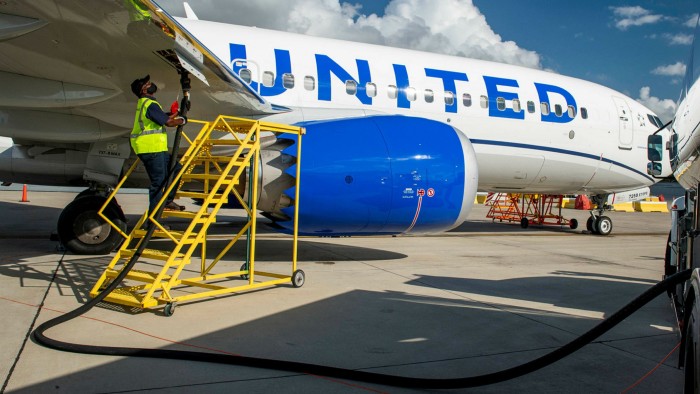Airlines navigate meeting climate change pledges

Simply sign up to the Airlines myFT Digest -- delivered directly to your inbox.
As politicians and business leaders sharpen their focus on climate change, the airline industry is accelerating its progress on becoming more climate-friendly.
Flights have a huge carbon footprint: on a return trip between London and New York, for example, CO2 emissions for each business-class passenger will be more than 1.2 tonnes, according to International Civil Aviation Organization calculations. As the sector takes on the huge task of decarbonisation, airlines are seeking advice from lawyers on how to approach it.
“This may turn out to be . . . a quantum leap for the entire industry,” says Kevin Lewis, co-head of law firm Sidley Austin’s aviation and airlines practice. It has advised United Airlines and American Airlines, among other aviation companies, on their sustainability goals.
He points out that airlines are developing new technologies and materials, “both for the vehicle itself and everything that goes in it, and the fuel and the infrastructure to create it”.

In October, before the COP26 UN climate change conference, leading airlines pledged to reach net zero carbon emissions by 2050 — an ambitious target for a polluting industry whose revenues have plummeted during the pandemic. Aviation accounts for about 2 per cent of human-induced carbon emissions globally and 12 per cent of emissions from transport, says the Air Transport Action Group, an industry non-profit group focused on sustainability.
“The whole industry is committed to completely transforming itself from consuming all that energy in a way that puts out a lot of carbon on a defined timeline, to an industry that does it in a carbon-neutral way,” Lewis says.
His work involves guiding companies through decarbonisation projects. “It’s a matter of improving the technology along with the equipment, and then everything that goes inside the aircraft as well,” he says. “Sustainable fuel is obviously the most important part.”
Clean energy technologies such as electricity and hydrogen are still years from being able to transport people long distances. Nevertheless, airlines are partnering with or investing in companies using nascent technologies.
United was the first US airline to sign a deal with Boom Supersonic, a Denver-based venture capital-backed company that is developing net zero supersonic jets. Boom says its Overture airliners will be flying by 2029 on 100 per cent sustainable fuel. United has ordered 15 aircraft, with an option for 35 more. The airline has also committed to an order worth $1bn with Archer Aviation, a New York-listed company working on electric flying taxis for use in cities.
In addition to due diligence and looking for potential collateral issues, says Lewis, working with technology companies is a key part of lawyers’ efforts on behalf of the airlines. “[There is a] lot of Silicon Valley money in high technology — skills that are being brought to what is to some extent an ‘old’ industry,” he explains.
This year, United formed a new investing arm, United Airlines Ventures, which will invest solely in start-ups focused on sustainability in the airline sector. Low-cost US carrier JetBlue has a similar investment arm, part of which focuses on advancing sustainable travel.
“You don’t want a mismatch between what you’re intending to do and the results you get,” says Lewis. “So that’s something that takes quite a bit of thought and planning.”
The lack of standardisation in sustainability targets in the airline industry creates challenges. But, rather than waiting for regulations to be drawn up, airlines have turned their attention to solutions — such as sustainable fuels and phasing out single-use plastics in onboard catering.
“Not only are there not agreed-upon standards of what it means to be sustainable or what sort of relationship with carbon a company has to have to be acceptable,” says Lewis, “there’s no agreed-upon way that you can measure it, or allocate it or figure out who gets credit for what.”
Besides helping airline executives understand the risks and benefits of early-stage investments, lawyers are advising on companies’ public proclamations of their sustainability plans.
“If a company’s going to be net zero, that’s not a legal standard,” points out David Curran, co-chair of the sustainability and environmental, social and governance practice at law firm Paul, Weiss, Rifkind, Wharton & Garrison.
“If that’s what they say publicly, it creates potential risk for them if they don’t support that,” he notes. For airlines, that means there will also be regulatory and financial risk from misleading customers and investors.
Case studies
Sustainability. All case studies researched, compiled and ranked by RSGI. ‘Winner’ indicates the organisation won an FT Innovative Lawyers 2021 award
Sustainability
WINNER: Sidley Austin
The firm is helping United Airlines to become a more sustainable business through a variety of projects. These include: United Airlines Ventures, an investment arm focused on sustainable fuels and aircraft; the launch of the Eco-Skies Alliance, a group of businesses that is buying approximately 3.4m gallons of sustainable fuel in 2021; and partnerships with companies working to develop either sustainable fuel or aircraft. Lawyers adapted the traditional sale and purchase agreements the airline works with to accommodate the risk of taking on these developmental technologies.
Bracewell

The firm advised Resource Environmental Solutions, which specialises in environmental mitigation, on the deconstruction of a series of dams on the Klamath River in Oregon and California that is damaging local ecology. The firm negotiated a contract with the Klamath River Renewal Corporation. As the first series of dams like this to be deconstructed in the US, there were many unknowns in the project — but the contract had to be negotiated with a fixed price in order to obtain regulator assent. Various stakeholder interests had to be considered, including those of two local Native American tribes, the Yurok and Karuk, that have campaigned for the dams to be dismantled.
Cadwalader, Wickersham & Taft
Since January 2020, fund finance lawyer Wes Misson has launched nine environmental, social and governance (ESG)-related fund facilities in the US, including the largest to date, for Bank of America. The $4.1bn ESG-linked credit facility is managed by private equity group Carlyle and pricing is tied to progress on achieving 30 per cent diverse representation on portfolio company boards within two years of ownership. As a nascent area of finance, lawyers and clients have limited market guidance to follow when ensuring the transactions satisfy legal, policy and regulatory requirements.
Dentons
The firm developed a way for businesses to earn carbon offset credits for products with a negative carbon output. Lawyers drew on the experience of business adviser Susan Wood, who formerly worked for AgCert, a company that produced and sold greenhouse gas emission credits, and partner Jeffrey Fort’s work with environmental non-profits the Delta Institute and the Chicago Climate Exchange. By using the firm’s method, originally developed in 2018, refrigeration company True Manufacturing was able to earn 2m carbon offset credits valued between $2 to $13 each for two technologies that reduce products’ carbon emissions.
Orrick

The firm advised the California Health Facilities Financing Authority on the financing of housing developments for vulnerable and homeless people. Rather than directly using the funds from a 1 per cent tax increase on people earning more than $1m a year, approved by voters in 2004, the money was raised through two bond issuances. These will be repaid using the tax revenue over the next 15 years. The lawyers used a service contract, which enabled them to work round the constitutional debt limit. More than $1bn has been raised so far, which will fund 4,500 or so housing units.
Paul, Weiss, Rifkind, Wharton & Garrison
The lawyers helped asset management firm Apollo launch an impact fund that links value to impact performance based on the UN’s sustainable development goals, while aiming for ambitious annual returns.
One project that received investment was Reno De Medici, a recycled cardboard manufacturer in Europe. As this form of ESG fund was a new venture for Apollo, the lawyers drew on their market intelligence and network, along with the firm’s own proprietary databases, to design a fund structure that could deliver the most impact as well as financial returns.
Pillsbury

In September 2020, the firm’s energy group launched a dedicated hydrogen practice, with 50 lawyers working with clients on a wide range of aspects of hydrogen power, from financing projects and corporate transactions to regulatory and policy advice. The practice worked with the US Department of Energy on a project to demonstrate how hydrogen can be produced from nuclear power, and with other clients on projects exploring how hydrogen can be used for car fuel. Partner Elina Teplinsky is a leading adviser for the NGO Clean Air Task Force, which lobbies for the adoption of nuclear and hydrogen technology.
Comments